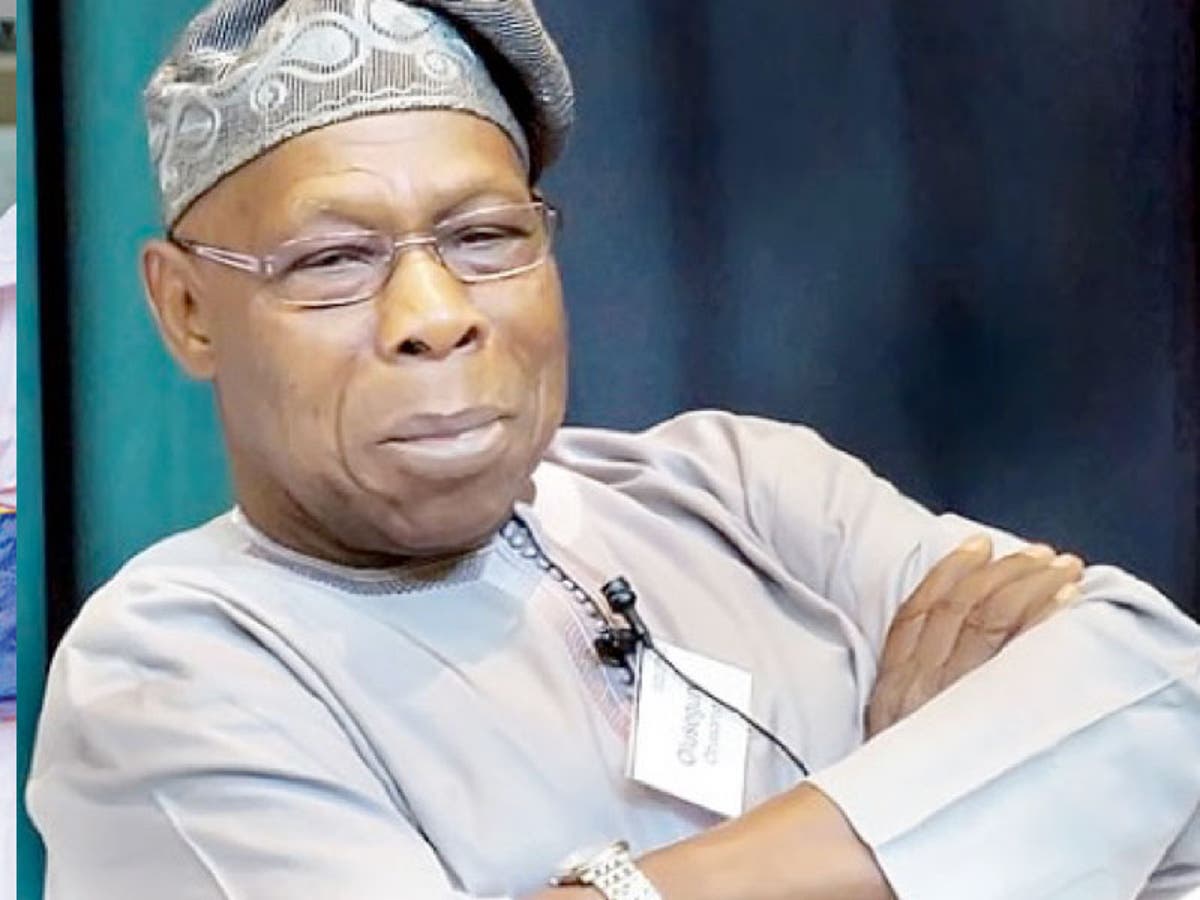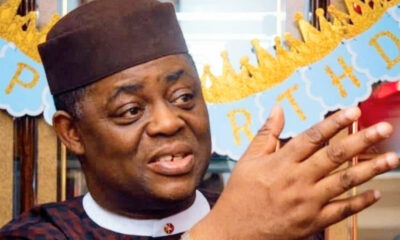News
Obasanjo fears Nigeria may disintegrate without restructuring

Obasanjo fears Nigeria may disintegrate without restructuring
Former Nigerian President Olusegun Obasanjo has called for the restructuring of Nigeria, stressing that the prevalence of ineffective administrative structures is detrimental to any country’s government.
Obasanjo made the call at the weekend in Enugu during the public launch of Engr. Chris Okoye’s book, ‘In Brotherhood, We Stand: A Roadmap for the Rebirth of a Fragmented Nation’.
The event took place at Immanuel Gardens, Independence Layout in Enugu.
Obasanjo, who was the chairman of the occasion, lamented that Nigeria had moved from one bad government to another.
Obasanjo said, “The clarion call in Nigeria today is one for restructuring and a reassessment of the terms of our union as a nation.
“No matter how economically viable a nation is, bad governance and the wrong system of administration can bring it down, as there is a direct correlation between economic and political reforms.
“Our historical experience in constitution-making and political reform shows that we may have some structural defects that require adjustment so as not to continue to constrain the deepening, widening, and consolidation of democratic values and practices.
“Indeed, some of the contradictions and challenges bequeathed by the colonial administration have continued to pose problems for us to this day.
“As things stand, therefore, our constitution-making efforts must go down to the grassroots to deal with the issues of inclusion, popular participation, ownership, and legitimacy.”
READ ALSO:
- Lagos fire updates: NEMA confirms 2 houses collapse, 14 buildings razed
- Our medical team tried to rescue policeman who died on Abuja-Kaduna train – NRC
- UCL: Arsenal 2-2 Bayern: Harry Kane on target as Trossard rescues draw for Gunners
Obasanjo, who spoke through a live video link at the occasion, lamented that “Nigeria, in one word, has moved from bad governance to another.
“In the process, we tried to adjust to the weaknesses of the system and equally adapted to do without some of those fundamentals that really ought to drive the political process.
“Some issues that have emerged include, but are not limited to, the challenge of constitutionalism and constitutional reform; the opportunity to bring all stakeholders together to discuss the preferred political path for the nation; the challenge of building new, accountable, responsive, and focused leadership; and how to build, operate, and sustain real political liberties, social justice, rights, and obligations; electoral reforms that ensure credibility and respectability of elections; relations between tiers of government; the performance of government; and how to ensure truly democratic governance for all.
“In all of these, the central challenge is still how to strengthen the social contract between the custodians of state power and the governed.”
While emphasizing the need for unity, integration, and equity, the former president stated that all hands must be on deck to propel Nigeria ahead.
Obasanjo mentioned that “what we want in Nigeria today is unity, cohesion, equity, togetherness, and collective commitment to our progress and the Nigeria project.
“We want to move forward, look forward, think about the past to help the present and the future and work for a stronger and more united Nigeria.
“It is unhelpful to devote time and energy to unrealistic, even unpatriotic, strategies for precipitating crises, conflicts, deadlock, and disintegration. In a democracy, there must be checks and balances, and there must be effective watchdogs.”
Speaking on the book, Obasanjo said: “This book is of great interest to me as a person because it is a direct fallout from the National Political Reform Conference, which my administration organized in 2005.
“And to us as a nation, because the content of the book is a much-needed panacea for many of the ills plaguing our nation today.”
Dignitaries at the event included former presidential candidate of the Labour Party (LP), Mr. Peter Obi; former President of the Nigerian Senate, Senator Ken Nnamani; and former Governor of Imo State, Ikedi Ohakim.
Others include Senator Victor Umeh; former Chief of Naval Staff, Admiral Allison Madueke (retd); former Minister of Information, Frank Nweke; and former Vice Chancellor of UNN, Prof. Chinedu Nebo, among others.
Obasanjo fears Nigeria may disintegrate without restructuring
chronicle
News
Currency in circulation now N4.8tn – CBN report

Currency in circulation now N4.8tn – CBN report
Currency in circulation has reached an all-time high of N4.8 trillion as of November 2024, recording over seven per cent increase from the previous month.
Also, currency outside banks grew significantly in the same month hitting an all-time high of N4.6 trillion from the N4.2 trillion in the month of October.
These figures were contained in the money and credit supply data from the Central Bank of Nigeria (CBN).
The currency in circulation is the amount of cash–in the form of paper notes or coins–within a country that is physically used to conduct transactions between consumers and businesses.
It represents the money that has been issued by the country’s monetary authority, minus cash that has been removed from the system.
Similarly, currency outside a bank refers to cash held by individuals, businesses and other entities that is not stored in banks.
The currency outside the bank represents about 96 per cent of the currency in circulation.
Nigerians have in recent times been facing acute cash shortage with banks limiting daily withdrawal at Automated Teller Machines (ATMs) to N20,000 irrespective of the number of accounts held by an account owner.
READ ALSO:
- Cross River man kills mother, dumps body inside well
- El-Rufai mocks Reno Omokri with throwback protest photos against Tinubu
- Warri refinery: Marketers hopeful of further petrol price drop
According to the latest data, the currency in circulation grew by seven per cent to reach 4,878,125.22 from 4,549,217.51 in October.
Currency in circulation has grown steadily in the outgoing year 2024 with over one trillion naira added to cash in circulation after starting the year with N3.65 trillion in January.
In February, the currency in circulation slightly increased to N3.69 trillion representing an increase of N43 billion or 1.18 per cent from the January figure.
March also saw an appreciable increase to N3.87 trillion while it further increased to N3.92 trillion in the following month of April.
The growth trajectory continued in May with the currency in circulation increasing slightly to N3.97 trillion, an increase of N42 billion or 1.07 per cent while it reached an all-time high of 4.04 trillion, an increase of 2.11 per cent from May.
The July figure also rose marginally with the currency in circulation settling for N4.05 trillion before growing to N4.14 trillion in August and N4.43 trillion in September and N4.5 trillion in October.
In the same vein, currency outside banks grew from N4.2 trillion in October to N4.6 trillion in November, showing increasing preference for other means of storing outside bank deposits.
Economist, Dr. Paul Alaje attributed the development to the expanding money supply, adding, “Money supply is expanding but this may not necessarily be in cash. As it is expanding, it will necessarily induce inflation. But you can’t blame the people. People must look for money. How much was bottled water last year, how much is it today? All of this will induce inflation. If you now ask, what is the cause of inflation? Is it money supply itself or a devaluation policy? It is a devaluation policy. Money supply is an offshoot. So the Central Bank is raising interest rates to actually reduce money supply but the more they try the more money supply expands.”
He stated that the floatation policy of the CBN has created inflation, adding, “It is like chasing one’s tail and I don’t know if you are going to catch it.”
Currency in circulation now N4.8tn – CBN report
News
Tinubu not telling Nigerians the truth, says Sule Lamido

Tinubu not telling Nigerians the truth, says Sule Lamido
President Bola Tinubu has been accused of not being forthright about the true state of Nigeria under his administration.
Former Jigawa State Governor and senior Peoples Democratic Party (PDP) member, Sule Lamido, made the accusation while speaking on the BBC Hausa programme Gane Mini Hanya.
Lamido criticized both Tinubu and former President Muhammadu Buhari for what he described as a lack of transparency in governance.
“Buhari’s and Tinubu’s governments are not being transparent with Nigerians unlike during the time when PDP was in power where everything was transparent and open to all Nigerians,” Lamido said.
READ ALSO:
- Odili: Fubara prevented Wike from turning Rivers to private estate
- Putin apologises over Azerbaijan plane crash reportedly shot down
- 256 terrorists, two logistics suppliers arrested in one week – DHQ
He accused the two administrations of relying on propaganda rather than providing citizens with accurate information.
Lamido also expressed concerns over President Tinubu’s recent loan requests, questioning the logic behind them. “If Nigerians are being told the truth then there is nothing wrong with that, but how would you budget N30tn, generate N50tn and then request loan when you have a surplus of N20tn,” he said, referencing last year’s budget.
He described the situation as “reckless” and “selfish,” adding, “This recklessness and clear-cut selfishness is not done anywhere in the world, but yet you find (some) Nigerians supporting it. Visit social media and see how APC is being criticised, being referred to as calamity, yet you find some protecting it.”
Tinubu not telling Nigerians the truth, says Sule Lamido
News
Nigeria Customs Service begins 2025 recruitment [How to apply]

Nigeria Customs Service begins 2025 recruitment [How to apply]
The Nigeria Customs Service (NCS) has announced the commencement of its recruitment exercise, assuring Nigerians that the process is entirely free and fair.
The agency has cautioned the public to be vigilant against scammers who may attempt to exploit unsuspecting applicants during the recruitment period.
Applications are invited for positions in the Superintendent, Inspector, and Customs Assistant cadres as part of the Service’s plan to recruit 3,927 officers in 2025.
This initiative is aimed at enhancing trade facilitation and supporting Nigeria’s economic recovery efforts.
“Our recruitment is entirely free and fair. At no stage do we charge fees. Anyone requesting payment is a scammer,” the agency emphasized, urging applicants to be wary of fraudulent schemes.
READ ALSO:
- Dangote, Tinubu, Lookman, Badenoch named among 100 most influential Africans in 2024
- Heavy security in Ilesa as ex-Osun deputy gov emerges new Owa-Obokun
- Hacker has stolen N180m from my NGO account – VeryDarkMan cries out
The NCS outlined eligibility criteria, stating that applicants must be Nigerian citizens by birth, possess a valid National Identification Number (NIN), and have no criminal record or ongoing investigations.
Academic qualifications for the three cadres are as follows:
Superintendent Cadre: A university degree or Higher National Diploma (HND) along with an NYSC discharge or exemption certificate.
Inspectorate Cadre: A National Diploma (ND) or Nigeria Certificate in Education (NCE) from an accredited institution.
Customs Assistant Cadre: At least an O’Level certificate (WAEC or NECO).
In addition to these qualifications, the NCS stressed that all applicants must be physically and mentally fit, providing evidence of medical fitness from a recognized government hospital.
Nigeria Customs Service begins 2025 recruitment [How to apply]
-

 Politics3 days ago
Politics3 days agoGbajabiamila speaks on his rumoured Lagos governorship ambition
-

 metro3 days ago
metro3 days agoFarotimi to pursue disbarment over arrest, defamation allegations
-

 Business2 days ago
Business2 days agoReal reason Dangote, NNPC drop petrol price — IPMAN
-

 Health2 days ago
Health2 days agoABU Teaching Hospital will begin kidney transplant in 2025 – CMD
-

 Sports1 day ago
Sports1 day agoAnthony Joshua prostrates before Governor Abiodun during Ogun visit
-

 metro3 days ago
metro3 days agoEl-Rufai accuses Tinubu govt of Yoruba agenda, Reno Omokri reacts
-

 metro3 days ago
metro3 days agoNigerian govt urged to intervene in Mozambique post-election violence
-

 metro1 day ago
metro1 day agoN180m not missing from my account, it was all a plan – Verydarkman











